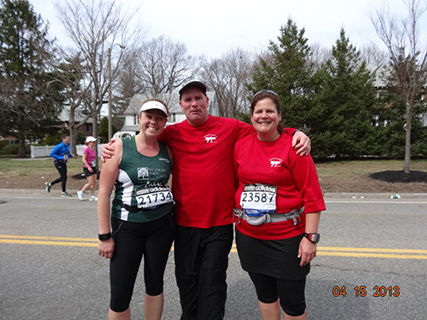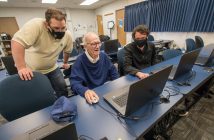Julie Arrison ‘01 and Erica Mellone ‘02 experienced the crisis that was the Boston Marathon this year. Both Mellone and Arrison were running for charities that are dear to their hearts—Mellone for the Alzheimer’s Association, as her late grandfather had the disease for many years, and Arrison for the Franklin Park Coalition.
They say when the blasts occurred, confusion reigned.
“I was getting to the top of Heartbreak Hill when we heard about it on the course as ‘an explosion,’ and we were told the course was closing down,” says Mellone.
Closer to the finish in Brookline, Arrison noticed many police vehicles whizzing past but assumed they were attending to a medical issue.
“Around Washington Square in Brookline, a woman running in front of me stopped abruptly and was crying into her phone about bombs. She mentioned the bombing locations and a man running behind me crumpled to the ground in hysterics because his family was going to be at one of those locations,” says Arrison, “I turned off my GPS watch at 23.06 miles and sat in the middle of Beacon Street hugging this crying stranger. I got about 90 frantic text messages in a short time span and knew that this was serious.”
The initial confusion was replaced by spectators, volunteers and even runners helping one another in any fashion possible.
“We were kept first at medical tents and then at churches and municipal buildings until the course was safe to be open and for the runners to return to downtown,” recalls Mellone. “It was freezing and one runner made ponchos out of trash bags for all of the shivering people.”
With cell phone service unavailable, both girls struggled to contact friends and family to pass on the message that they were safe.
As Arrison and her friend made their way back into the city, wrapped in their trash bags to stay warm, the phone service was restored, but still, they were not able to reach Arrison’s friend’s husband and son, who were assumed to be at the finish line.
When they reached the finish line, it wasn’t the scene they had expected.
“We walked among SWAT teams and soldiers with machine guns. Our finish line experience was literally a war zone,” says Arrison.
The two eventually learned that Arrison’s friend’s husband had lost a leg while running from the first explosion and into the second and was at Boston Medical Center. Her son suffered a small skull fracture and was at Children’s Hospital.
Her friend’s response: “I still have a husband and son. That’s all I need to know for now.”
A week later, Mellone put on her Alzheimer’s Association shirt and bib number and went back to Boston to finish the race she started.
“Friends assembled in Copley thanks to a Facebook post, and I finished what I set out to do,” says Mellone. “The Boston Athletic Association has decided to give the non-finishers that made it past the half-marathon mark a bib for next year, and I couldn’t be more excited. Once again, I’ll be running in memory of my grandfather with my Alzheimer’s Association team, and the dream I shared with my grandfather will come true.”
The weeks that followed the marathon were traumatic ones for Arrison and many of her friends that were either runners, spectators or volunteers.
“Many of us sought a counseling session,” she says. “Many of us participated in group runs or candlelight vigils. It was a grief and a stress like no other that I had felt before.”




